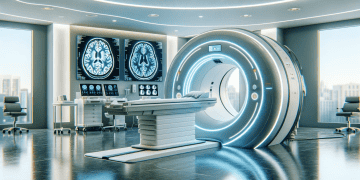Recent research highlights the potential benefits of early brain scans in babies to mitigate the risk of strokes later in life. These findings, presented by a team of scientists, underscore the importance of early detection and intervention in managing long-term health outcomes.
The study focuses on the utility of advanced imaging techniques to identify early signs of brain abnormalities that could predispose individuals to strokes in adulthood. By leveraging these early scans, healthcare providers can monitor and manage these risks more effectively from a young age, potentially reducing the incidence of strokes as the population ages.
The researchers utilized sophisticated brain imaging technology to conduct their study, examining a cohort of newborns. The scans revealed that certain brain patterns and abnormalities, detectable at an early age, are strongly correlated with an increased risk of stroke later in life. These findings suggest that routine early brain scans could play a crucial role in preventive healthcare strategies.
One of the key aspects of the study is the emphasis on early intervention. The researchers advocate for the integration of brain scans into standard neonatal care practices. By identifying at-risk individuals early, medical professionals can implement targeted interventions and continuous monitoring to address potential health issues before they manifest more severely.
The implications of this study are significant for public health policy. Integrating early brain scans into regular healthcare protocols could lead to a substantial decrease in stroke incidence, thereby reducing the associated healthcare costs and improving quality of life for many individuals. This proactive approach aligns with broader efforts to enhance preventive care and early diagnosis, crucial components of modern healthcare systems.
Moreover, the research opens new avenues for further studies to explore the long-term benefits of early brain scans. Future research could investigate the specific types of interventions that are most effective for individuals identified as high-risk, as well as the cost-effectiveness of widespread implementation of early scanning programs.
In summary, the recent study presents compelling evidence that early brain scans for babies could be instrumental in reducing the risk of strokes in adulthood. This preventive measure, if adopted widely, has the potential to transform healthcare practices and improve long-term health outcomes. SupplyChainReport will continue to monitor developments in this area, providing updates on how these findings influence healthcare policies and practices globally.
Discover supply chain news insights on The Supply Chain Report. Enhance your international trade knowledge at ADAMftd.com with free tools.
#EarlyBrainScans #StrokePrevention #NeonatalCare #BrainHealth #PreventiveHealthcare #HealthIntervention #AdvancedImaging #HealthcareInnovation #PublicHealthPolicy #StrokeRiskReduction #LongTermHealth #BabyHealthCare #EarlyDiagnosis #HealthcareResearch #SupplyChainReport















